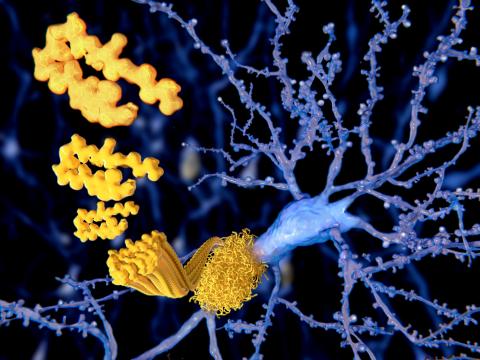Reaction to method that could predict Alzheimer's risk before symptoms appear
Scientists have analysed data on 7.1 million common DNA variants (alterations in the standard sequence) in people with and without Alzheimer's disease. The results, published in PLOS Genetics, have helped them to develop a method that can predict the risk of suffering from this neurodegenerative disease, depending on the DNA variants that a person has and before presenting symptoms.

Inés Moreno - predecir alzhéimer EN
Inés Moreno
Full professor at the University of Málaga
Alzheimer's disease is the most common dementia among people over the age of 65. In addition to familial cases, where the presence of a gene mutation that causes the disease to develop earlier is known, sporadic cases are usually associated with different risk factors. These factors are multiple and range from environmental factors and habits in everyday life to genetic factors, which predispose a person to a higher risk of developing the disease. Several research groups have used genomic studies to identify these genetic factors in order to diagnose the disease in asymptomatic patients. This would also allow for better performance of therapies being developed that can be administered before cognitive failure and brain pathology become irreversible.
The study presented by Paranjpe et al. conducted a comprehensive study in a large cohort of individuals analysing the genetic profile and levels of certain proteins that could be reliable indicators of an increased likelihood of developing dementia. The publication indicates that they have identified new markers that could indicate this risk in patients, especially in those under 65 years of age who initially had no symptoms but eventually developed dementia.
This is a well-conducted study with a large number of participants and is consistent with previous studies, which take into account other variants such as the apoprotein 4 allele and other factors. The advantage of this study is the identification of those risk factors that are independent of other environmental factors but may ultimately be modulated by modifiable factors. The disadvantage of these studies is that the direct application to the population is very limited, as it would be advantageous if these genomic studies were routinely performed in primary care in order to rapidly prevent, diagnose and treat those at high risk. For this to become practical, ways have yet to be found to perform these studies routinely. However, we must first have this information in order to be able to use it in the clinic in the future.
Paranjpe et al.
- Research article
- Peer reviewed
- Observational study
- People
- In vitro



